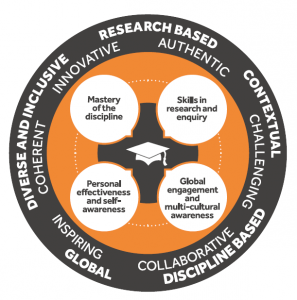The Curriculum Framework
The Curriculum Framework outlines a set of programme principles which underpin the curriculum and engender the range of attributes expected for University of Reading graduates. These principles are used by programme teams in the design, delivery and enhancement of new and existing programmes and modules.
Download the full Curriculum Framework here

Programme Principles
How the Programme Principles are enacted will vary by discipline/field of study. Programme teams have an important role to
play in contextualising the principles and ensuring alignment between relevant QAA Subject Benchmark Statements
and Professional, Statutory and Regulatory Bodies.
Principle 1: Coherent
Programmes are purposefully designed to ensure that modules form a coherent integrated and blended whole. The
learning pathway through the programme is articulated and shared with students.
This is achieved by:
1.1 Aligning teaching, learning and assessment to the learning outcomes of programmes and of associated
modules.
1.2 Planning programmes to ensure consistency of student experience and expectations across
modules.
1.3 Mapping development of skills across programmes.
1.4 Designing teaching, learning and assessment to be appropriately and progressively challenging from the
outset, building on prior knowledge/skills.
1.5 Designing in and integrating both face-to-face learning and digital learning experiences throughout the
programme.
1.6 Planning assessment across a programme to shape learning and provide regular, timely opportunities for
feedback and reflection.
Principle 2: Connected
Programmes are informed by, and develop a sense of connectedness to, the University community and beyond.
They are designed to be mindful of the need to prepare students for life beyond university.
This is achieved by:
2.1 Collaborating with internal and external stakeholders to design programmes which are informed by
pedagogic research and developments across the sector and beyond.
2.2 Creating a community of scholars by connecting students with the University’s research.
2.3 Embedding research and enquiry progressively throughout the programme to enable students to undertake
a substantial piece of independent research.
2.4 Developing knowledge and skills which students can connect to the real world through authentic teaching,
learning and assessment.
2.5 Building opportunities for personal and professional development through work-related learning which is
enhanced by co-curricular and extracurricular engagement.
2.6 Engaging students with multiple perspectives through collaborative learning opportunities within and
beyond their cohort.
2.7. Building teacher presence both on campus and online using different approaches and techniques.
Principle 3: Student centred & inclusive
Programmes are designed and delivered to ensure all students can access and actively engage in their blended
learning opportunities through student-centred and inclusive approaches to teaching, learning and assessment.
Students work in partnership with staff to shape the programme.
This is achieved by:
3.1 Teaching which is interactive and facilitates active learning through engaging students in discussions,
problem solving, application, and experiential activities.
3.2 Building students’ academic literacy, digital capabilities and their confidence as autonomous learners by
scaffolding teaching, learning and assessment.
3.3. Varying the approaches to teaching, learning and assessment, both face-to-face and digital, enabling
students to study flexibly.
3.4 Planning for and providing clear expectations, and appropriate structure and support, throughout the
programme.
3.5 Making best use of both physical and online resources to create a rich and varied learning environment.
3.6 Diversifying and decolonising the curriculum by recognising the contributions made by different genders,
cultures, races and the perspectives of/impact on different groups, enabling students to see themselves in
their discipline.
3.7 Creating accessible learning materials and experiences ensuring students can easily engage with
them.
3.8 Working in partnership with students to regularly evaluate and develop the programme
Principle 4: Sustainable
Programmes integrate education for sustainable development appropriate to the discipline. They make effective use
of resources and digital learning opportunities as part of an outstanding blended learning experience for students.
This is achieved by:
Education for sustainable development
4.1 Embedding opportunities and empowering students to engage with environmental, social and economic
challenges within their programme and beyond.
Use of resources
4.2 Ensuring programmes are distinctive, reflective of student and market demand and deliver on financial
and/or strategic requirements.
4.3 Designing programmes that are resilient to changes in resources and circumstances.
4.4 Structuring programmes to be simple, clear and easy to follow.
4.5 Planning programmes to enable a realistic choice of optional modules where appropriate, balanced with the
need for coherence.
4.6 Ensuring teaching, assessment and marking are proportionate and distributed effectively to support learning
and wellbeing for staff and students.
4.7. Ensuring all colleagues designing and delivering the programme engage in appropriate professional
development.
4.8 Planning for parity of student workload between modules that have the same credit weighting.
4.9 Reducing our carbon footprint by delivering and resourcing programmes in environmentally sustainable
ways.
Graduate Attributes
Graduates of the University of Reading develop a range of attributes. The knowledge, competencies and skills which
all programmes inculcate and enable students to demonstrate are outlined below.
Mastery of the discipline
Breadth and depth of knowledge of one or more
disciplines and its/their use/applicability in real-world
contexts. Discipline-specific skills and attributes.
Understanding of disciplinary epistemology and
methodology. Awareness of current research in the
discipline/s. Ability to undertake research and enquiry
within their discipline/s. Autonomous learning within the
discipline/s.
Skills in research & enquiry
Ability to learn through research and enquiry. Ability to
design, undertake and present research as appropriate to
their discipline. Ability to consume and appraise research
critically.
Personal effectiveness
Ability to articulate what and how they have learned,
awareness of their strengths and areas to develop, and
commitment to lifelong learning and reflection.
Development of self-efficacy, intellectual curiosity,
adaptability, and resilience. Personal responsibility for
self-directed learning and continuing academic and
professional development. Ability to communicate
effectively for a variety of purposes and audiences.
Global and future-facing outlook
Valuing of multiple perspectives and diversity to enable
students to make well-informed ethical decisions.
Intercultural competence and international engagement.
Integrating social and civic responsibility, exploring global
citizenship, and positively contributing to addressing
sustainability issues within the context of their discipline,
their personal lives, professions, and communities. Ability
to collaborate effectively and adapt to different work or
study contexts.
